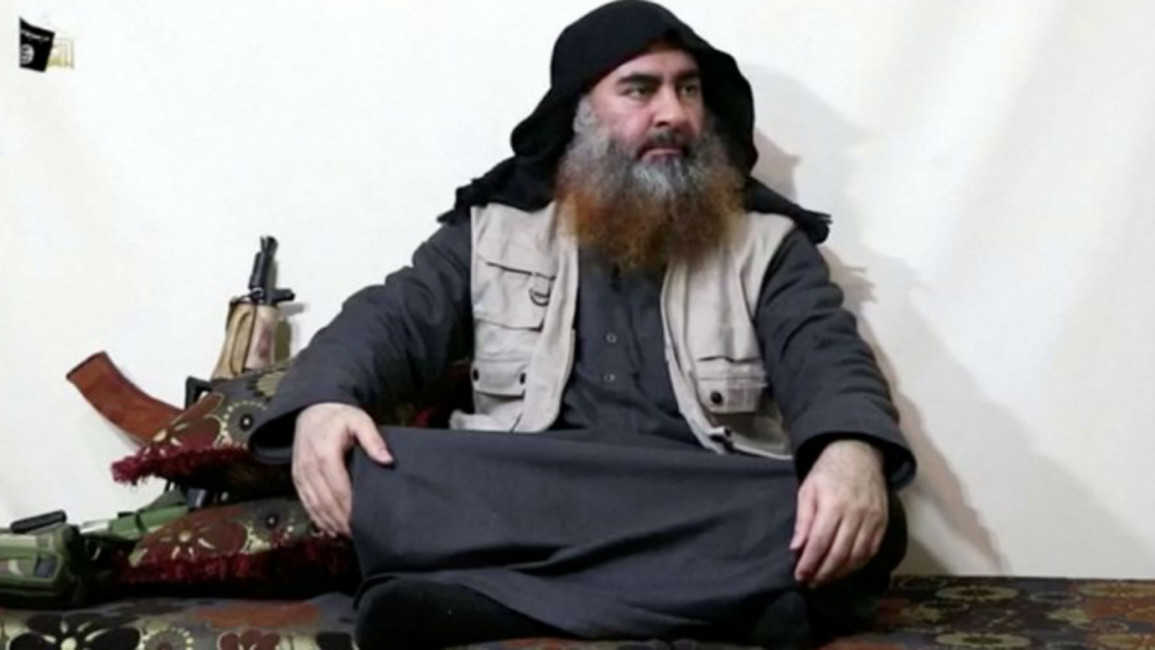IS chief Baghdadi threatens revenge attacks following Syria defeat
The video acknowledged IS' defeat in the Syrian town of Baghouz - ending the group's so-called "caliphate" - while Baghdadi threatened "revenge" attacks.
The world's most wanted man was last seen in Mosul in 2014, announcing the birth of IS' much-feared "caliphate" across swathes of Iraq and Syria. The Iraqi jihadi leader appears to have outlived the proto-state.
In the video released by IS' Al-Furqan media arm, the man said to be Baghdadi referred to the months long fight for IS' final redoubt Baghouz, which ended in March.
"The battle for Baghouz is over," he said, sitting cross-legged on a cushion and addressing three men whose faces have been blurred.
He referred to a string of IS defeats, including its one-time Iraqi capital Mosul and Sirte in Libya, but insisted the jihadists had not "surrendered" territory.
"God ordered us to wage 'jihad.' He did not order us to win," he said.
In a segment in which the man is not on camera, his voice described the 21 April Easter attacks in Sri Lanka, which killed 253 people and wounded nearly 500, as "vengeance for their brothers in Baghouz".
The man insisted IS' operations against the West were part of a "long battle", and that IS would continue to "take revenge" for members who had been killed.
"There will be more to come after this battle," he said.
'It's survivable'
The United States, which has a $25 million bounty on Baghdadi's head, said it was assessing the authenticity of the video but vowed to keep up the battle against the extremist group.
The US-led coalition will "ensure an enduring defeat of these terrorists and that any leaders who remain are delivered the justice that they deserve", a State Department spokesman said.
Even if Baghdadi is alive and well, the spokesman said that the militants, frequently called IS, had been battered.
"[IS] territorial defeat in Iraq and Syria was a crushing strategic and psychological blow as [IS] saw its so-called caliphate crumble, its leaders killed or flee the battlefield, and its savagery exposed," he said.
Earlier this month, US warplanes dropped leaflets over Iraq offering a reward of $25 million in return for information that would lead to the capture or killing of Baghdadi.
The planes dropped the leaflets over Upper Euphrates towns, Bedouin encampments, and villages adjacent to the borders with Syria, Jordan and Saudi Arabia, according to Anbar province police sources.
The speaker in the video identified as Baghdadi referred encouragingly to popular protests in Sudan and Algeria, apparently to demonstrate the video was recent.
"The mention of places like Sri Lanka and Sudan are largely to timestamp the video, to show that it wasn't created a long time ago," said Amarnath Amarasingam, senior research fellow at the Institute for Strategic Dialogue.
He said the references to lost territory were also an effort to reshape IS' narrative.
"Part of the importance of someone like him is to contextualise the defeat... to show that this was either an expected turn of events, or that it might be unfortunate but that it's survivable," Amarasingam told AFP.
The speaker appeared in a white-walled room lined with cushions, but it was unclear exactly where or when the footage was shot.
He had a long grey beard that appeared dyed with henna and spoke slowly, often pausing for several seconds in the middle of his sentences.
An older-model Kalashnikov assault rifle, similar to those seen in videos of Al-Qaeda's former chief Osama bin Laden, leaned against the wall behind him.
At the end of the video, he appeared to examine monthly reports of IS' global activities, including in areas that have not been officially declared IS "provinces" yet.
The man in the 18-minute video was identified as Baghdadi by both SITE, which tracks IS, and Hisham al-Hashemi, an Iraqi expert on the group.
Who is Abu Bakr al-Baghdadi?
Baghdadi has been rumoured dead many times. A character shrouded in mystery, making only one public appearance in 2014, Baghdadi's real name may be Ibrahim Awwad Ibrahim al-Badri, and he may have been born in 1971 in Samarra, an ancient Iraqi city in the so-called Sunni Triangle north of Baghdad.
He may have been a cleric in a mosque in the city around the time of the US-led invasion in 2003. Reports suggest he was radicalised during the four years he was held at Camp Bucca, a US prison in southern Iraq where many al-Qaeda commanders were detained.
He emerged as the leader of al-Qaeda in Iraq, one of the groups that later became Islamic State of Iraq and the Levant (ISIS) in 2010 and then Islamic State group in 2014, and rose to prominence during the failed merger with al-Qaeda-linked Nusra Front in Syria (now Jabhet Fateh al-Sham).
He did not swear allegiance to the leader of the al-Qaeda franchise, Ayman al-Zawahiri, who had urged IS to focus on Iraq and leave Syria to al-Nusra.
Baghdadi and his fighters split with al-Qaeda and pursued an ultraviolent form of extremism that included bringing back slavery, engaging in genocide on non-Muslim minorities and Shia Muslims, and applying an extreme version of Islamic capital punishments, involving live immolation and mass beheading.
The group and lone wolves inspired by it have claimed numerous terror attacks from the US to the Philippines, via Europe and the Middle East.
In 2014, following his group's rapid capture of Mosul and vast swathes of western Iraq, he declared himself from the pulpit of al-Nouri Mosque in the Old City of Mosul the new caliph, leader of the entire Muslim nation, a title abolished in 1924 with the fall of the Ottoman Empire.
Follow us on Twitter: @The_NewArab



